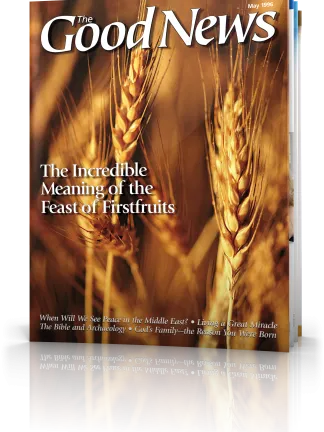The Lesson of the Feast of Firstfruits

If Jesus Christ intended to save the world, has the world truly been saved? Is it logical to conclude, when we observe man’s inhumanity to man on an unprecedented scale, that the world is saved? Did Christ fail in His mission, or have we greatly misunderstood His intentions?
Jesus Christ Himself said He "did not come to judge the world but to save the world" (John 12:47). But in a world in which hundreds of people die every day from wars, civil unrest and murder-in which thousands die daily from starvation, disease and natural disasters; accidental deaths claim hundreds more; injustice, immorality and every godless act abounds; professing Christians go to war against and kill other Christians; thousands die daily without having heard the name of Jesus Christ or even seen a Bible, much less read one-can we truly say that Christ's mission was successful?
Was Jesus Christ mistaken? Has He not succeeded at what He said He would do? Doesn't the very condition of the world itself show that God has failed in the very purpose for which Jesus said He was sent into this world? After all, we are told that "God did not send His Son into the world to condemn the world, but that the world through Him might be saved" (John 3:17).
If Jesus intended to save the world, then has the world truly been saved? Is it logical to conclude, when we observe man's inhumanity to man on an unprecedented scale, that the world is saved?
Enigmatic questions
These questions have always posed an enigma to thoughtful people willing to face the facts. If the Christian Church had as its mission to take the message of Christ in power to the world so the world could be saved, why is the world in such religious disarray? Further, if the gospel Jesus Christ brought holds the answers to man's problems, why is the world in such sad moral shape?
Did Christ fail to gain the cooperation of His own Church to carry out this mission? Is that the problem? Is He not able to inspire the faith in His professed followers to do greater works than He (John 14:12), as He promised? Or are the opposing forces simply too powerful for faithless mankind? The answer is none of the above.
However, there are answers to all these questions, and, remarkably, they are illustrated in a festival called the Feast of Firstfruits (Exodus 23:16). This observance, along with other of God's annual Holy Days, is commanded by God in Leviticus 23:15-21.
In describing this and other sacred observances, God said, "Speak to the children of Israel, and say to them: 'The feasts of the LORD, which you shall proclaim to be holy convocations, these are My feasts'" (verse 2).
Later, we find the Church Jesus founded also observed this festival, known by Jesus' followers as the Day of (or Feast of) Pentecost. As a matter of fact, the founding of New Testament Church occurred on this very day, and was accompanied by other miraculous events (Acts 2:1-41). It has great relevance and importance for Christians today.
God had a reason for His nation Israel to keep His festivals and later for His Church to observe them. Through these observances, God reveals to His people the stages of His plan of salvation for humanity. In particular, the feast celebrating the harvest of the firstfruits, or Pentecost, has a meaning that reveals one of the major phases of God's plan for salvation.
Common, but erroneous, assumptions
Most branches of professing Christianity assume that God intended for everyone to hear the message of salvation, starting immediately after Jesus Christ's resurrection.
Further, most believe that every person hearing that message would at that point have his opportunity for salvation now, in this life. The various churches' mission was thus to bring this message to every living person, giving him the opportunity to accept Christ before it would be too late. This general view, adopted by most of the Christian world, has resulted in churches believing they must bring as many people as possible to accept Christ immediately, regardless of the depth of their interest or commitment.
But, you should ask yourself, how many people have never accepted Christ? And how many untold millions over the centuries have never heard of Him? If salvation is a matter of accepting Christ in this physical life, what is the fate of the hundreds of millions of people who lived and died before Jesus Christ was born and for whom it was impossible to accept Christ?
Faced with these questions, must we conclude that the power Jesus promised His disciples simply never translated into the saving work He envisioned?
No, we should not doubt the saving power of Jesus Christ. Instead, perhaps we should examine our understanding of His intentions. We should take a long look at several commonly held beliefs.
If Christ intended to bring the world to Himself and make the world understand, He certainly could have exercised the authority and power to accomplish that task. After all, He said that "all authority has been given to Me in heaven and on earth" (Matthew 28:18).
The apostle Paul wrote that Christ was resurrected and sits with God the Father ". . . in the heavenly places, far above all principality and power and might and dominion . . ." (Ephesians 1:20, 21).
If Christ's power and authority, which are far greater than any other, are not strong enough to triumph over the opposing powers of darkness, then perhaps we should feel a little nervous.
Or perhaps God has had something else in mind all along.
How this feast fits in God's plan for humanity
What does the Feast of Firstfruits, also known as the Day of Pentecost, have to do with these all-important questions?
There is great significance in the name, Feast of Firstfruits. By its very name, this festival indicates that there is more than one time of harvest.
As we will see, this festival foreshadows God's intention to reap a small harvest of people for salvation (called "firstfruits" in the Scriptures), and to later call a vastly greater number of people to salvation.
One might say that God put into use a systematic procedure to lead the vast majority of mankind to His light and salvation: bringing first the firstfruits, and later the greater harvest of humankind, to salvation.
Let us notice this amazing truth as demonstrated by the divinely revealed festivals of God. God timed His feasts to coincide with the agricultural cycle of the two harvests in Palestine-one in spring and the other in the autumn-to teach His people an important lesson.
The Feast of Firstfruits coincided with the first harvest, the barley and wheat harvest in that area (Exodus 34:22). This festival was also known as the Feast of Weeks (Deuteronomy 16:9, 10). The Greek name for this feast is Pentecost, meaning "fiftieth," in this case implying "fiftieth day." It was so named because it was celebrated 50 days from the harvest of the first sheaf of grain.
On this day, the Israelites offered two loaves of bread made from flour taken from the new grain of the harvest. These loaves were called "the firstfruits to the LORD" (Leviticus 23:16, 17). The people were to "do no customary work" on this day and gather for a sacred religious assembly (verse 21). This was a very significant occasion.
A later festival, the Feast of Tabernacles or Ingathering (Exodus 34:22), coincided with the conclusion of the later harvest when all the produce, including cucumbers, melons, lentils, chick-peas, nuts and especially dates, figs, olives and grapes had been gathered. The threshing and winnowing of the grain had continued throughout the summer and was finally completed by the Feast of Tabernacles (Leviticus 23:39; Deuteronomy 16:13). This, too, was an event of great significance marked by sacred religious assemblies and cessation from work.
These two feasts both represent major stages in the spiritual harvest of mankind for salvation. The Feast of Firstfruits, or Pentecost, symbolizes the calling and preparing of the church in this age. This is the first spiritual harvest.
The later spiritual harvest will take place in the age to come. God's first harvest of people occurs in preparation for that coming age when Jesus Christ will bring His Kingdom to earth.
The physical depicts the spiritual
The spiritual significance of the first harvest, celebrated by the Feast of Firstfruits, is made clear in the Scriptures. ". . . Now Christ is risen from the dead, and has become the firstfruits of those who have fallen asleep . . . For as in Adam all die, even so in Christ all shall be made alive. But each one in his own order: Christ the firstfruits, afterward those who are Christ's at His coming" (1 Corinthians 15:20, 22, 23; author's emphasis throughout).
The wave sheaf offering, which began the barley harvest 50 days prior to Pentecost, pictured the resurrected Christ ascending to His Father (See "The Wave Sheaf Offering: A Ceremony Foreshadowing Salvation," p. 14). The offering of the firstfruits of the wheat harvest on Pentecost (Leviticus 23:17) was then symbolic of the firstfruits of God's harvest of humankind for salvation.
Did you notice that Paul, in 1 Corinthians 15, clearly states that God will resurrect the dead in a specific order? First was Jesus Christ, who was resurrected as "the firstfruits of those who have fallen asleep," to be followed by others at Jesus Christ's return.
Paul states that the resurrection of the saints at Christ's coming to immortal, spiritual bodies (verses 44, 53) will take place in an instant "at the last trumpet" (verse 52)-the mighty, supernatural clarion call that will announce the return of Jesus Christ to rule the earth (Revelation 11:15).
At that time, God will resurrect the dead who had previously been faithful to Christ, and He will change to immortal children of God-raising them to meet Jesus Christ in the air-those who are still alive and have likewise been faithful (1 Thessalonians 4:16, 17).
This miraculous event is described as "the first resurrection" in Revelation 20:6: "Blessed and holy is he who has part in the first resurrection. Over such the second death has no power, but they shall be priests of God and of Christ, and shall reign with Him a thousand years."
The world under Christ's rule
During this reign of Jesus Christ and the resurrected saints on earth (Revelation 5:10), the second harvest of humanity for salvation will begin. God's knowledge will at last be widely available, "For the earth will be filled with the knowledge of the glory of the LORD, as the waters cover the sea" (Habakkuk 2:14). All people will experience firsthand the wonderful Kingdom of God, which Jesus Christ proclaimed during His earthly ministry (Matthew 4:17; Mark 1:14; Luke 4:43).
Isaiah 2:2, 3 provides us a picture of the beginning of this latter and great harvest: "Now it shall come to pass in the latter days that the mountain of the LORD's house shall be established on the top of the mountains, and shall be exalted above the hills; and all nations shall flow to it. Many people shall come and say, 'Come, and let us go up to the mountain of the LORD, to the house of the God of Jacob; He will teach us His ways, and we shall walk in His paths.' For out of Zion shall go forth the law, and the word of the LORD from Jerusalem."
Humanity will then have the opportunity to learn and live according to God's ways. "No more shall every man teach his neighbor, and every man his brother, saying, 'Know the LORD,' for they all shall know Me, from the least of them to the greatest of them, says the LORD. For I will forgive their iniquity, and their sin I will remember no more" (Jeremiah 31:34).
What of those who have lived and died in the past, having never known anything of God the Father and Jesus Christ? Revelation 20:6, quoted above, shows that God's faithful saints are in "the first resurrection." But, if there is a first resurrection, there must be another. And indeed there is. The book of Revelation makes it clear that there will be another resurrection of the dead. After the 1,000-year reign of Jesus Christ and the resurrected saints on earth (Revelation 5:10), "the rest of the dead did not live again until the thousand years were finished" (Revelation 20:5).
This will continue God's great second harvest of humanity for salvation. At that time, all who have ever lived but did not have the opportunity to learn of God's ways or hear of Jesus Christ's atoning sacrifice will enjoy their opportunity for salvation. This resurrection of countless millions of people to a physical, perishable life is described in Ezekiel 37:1-11; Matthew 12:41, 42 and Revelation 20:5, 13. These people will gain the opportunity-for the first time-to repent and be converted through God's Holy Spirit (Acts 2:38; 3:19). Then they, too, will inherit eternal life.
We see in this wonderful plan the fulfillment of God's desire for "all men to be saved and to come to the knowledge of the truth" (1 Timothy 2:4).
God is "not willing that any should perish but that all should come to repentance" (2 Peter 3:9), and through His plan all who have never had the opportunity for salvation in their physical lives can be saved.
Firstfruits to overcome the world
The firstfruits of God's plan are those who are called now, in this age, and are having their minds and attitudes changed to become like Jesus Christ through God's Spirit working within them. The apostle James noted that God "chose to give us birth through the word of truth, that we might be a kind of firstfruits of all he created" (James 1:18, New International Version).
Paul well understood that those called and converted now, in this age, are the firstfruits of God's plan for the salvation of humanity. He referred to several first-century Christians as the firstfruits of God's calling in specific locations (Romans 16:5; 1 Corinthians 16:15). Looking forward to the resurrection of those who remain faithful to their calling, he said, "We also who have the firstfruits of the Spirit, even we ourselves groan within ourselves, eagerly waiting for the adoption, the redemption of our body" (Romans 8:23).
However, the firstfruits of God's plan, those who are called now, find themselves in a vastly different situation from that of those who will follow in the latter harvest. Jesus said that those who are His followers in this age are not to be "of the world, just as I am not of the world" (John 17:16). They are called out of the world and are expected to develop the character of Christ, while the rest of mankind is deceived (Revelation 12:9) and following values that are abhorrent to Christ (1 John 2:15-17).
The present evil age
The firstfruits-God's people-are called and strive to obey God while living in "this present evil age" (Galatians 1:4), of which Satan is the actual ruler (2 Corinthians 4:4). The harvest of first-fruits is small, because at this time relatively few will accept God's calling, repent, be converted and remain faithful to God's way of life. That is why Jesus said, "Narrow is the gate and difficult is the way which leads to life, and there are few who find it" (Matthew 7:14).
After Christ's return, which will usher in a new age, the world-society as a whole-will learn to live by the laws and values of God. In that age, God will bind Satan and not allow him to deceive the nations (Revelation 20:2, 3). Without Satan's influence, the world will at last know peace. Everyone will know the LORD (Hebrews 8:11).
Those who have not conformed to the world (Romans 12:2) will be those who assist Christ in bringing all nations to His truth (Revelation 20:4). They will overcome the world just as Jesus overcame the world, and Christ will use them in bringing all other people to serve Him (Revelation 2:26; 3:21).
Gift of the Holy Spirit
God enables His people to fulfill His purpose for them.
Significantly, God chose the Day of Pentecost to begin His Church by sending the Holy Spirit to His few faithful disciples (Acts 1:15; 2:1-4). Many think of a church as a building, but that is a relatively modern use of the word. The word translated "church" in the New Testament is ekklesia, meaning "called out (ones)." The Church is the collective body of people who are called out of the world to carry the gospel to every nation (Matthew 24:14; 28:19, 20).
Through the Holy Spirit, which God gives to those who are a part of God's Church, members are empowered to overcome the world. It is through God's Holy Spirit that the Church can preach the gospel to the world and make disciples of all nations (Matthew 24:14; 28:19). It is this Spirit that enables a person to belong to Jesus Christ and be a part of the Church (Romans 8:9). For there to be a Church, it was necessary for God to send His Holy Spirit. The Day of Pentecost marks the beginning of the Church of God.
The firstfruits of God's plan for salvation are those called to be in God's Church in this age. The Church, also spoken of as "the body of Christ" (1 Corinthians 12:27), is made up of individuals in whom dwells the Holy Spirit. They have repented of their sins and turned to Jesus Christ as their personal Savior. They have committed themselves to obedience to His holy and righteous laws. They are willing to give up everything to remain faithful to Jesus Christ (Luke 14:33).
Firstfruits follow Jesus Christ
Revelation 14:4 speaks of God's people who are "firstfruits to God and to the Lamb." The preceding and succeeding verses provide insight into the character of those who are the firstfruits and why they accompany Jesus Christ.
Why are they so valued by God? They are described as having the Father's name written in their foreheads (verse 1); God is foremost in their mind and thoughts. These have not been seduced by a false religious system (Revelation 14:4), which is depicted as an immoral woman seducing humanity (Revelation 2:20-22; 17:1-6).
The firstfruits have come out of and avoided the political and religious system that has dominated the world (Revelation 17:1-6). When they were called by Jesus Christ, they understood that they were to come out of this system (Revelation 18:3, 4).
In addition, the firstfruits "follow the Lamb wherever he goes" (verse 4). They are faithfully devoted to Jesus Christ. They will allow nothing to entice them from their personal loyalty to Him. Since Jesus will use them to assist Him to bring His knowledge to the world, it is vital that His firstfruits will forever be true to their Lord and Savior, Jesus Christ.
They "have been redeemed from among men" (verse 4). They have been purchased by God with the precious blood of Jesus Christ (1 Peter 1:18, 19). Having been bought by God, they know that their lives no longer belong to them, but rather to Jesus Christ (Galatians 2:20). They are now to glorify God in body and spirit (1 Corinthians 6:20).
Also, "in their mouth was found no guile" (verse 5). They have learned to deal with the malice commonly found in the hearts of men. There is no deception, plotting or feigning in their actions or words. They have learned about the genuineness, sincerity and simplicity of Christ. They have, in short, come to grips with the deceit of their own hearts and have fully submitted to the pure and unspotted life of Christ dwelling in them. For these things, "they are without fault before the throne of God" (verse 5).
Picturing the plan of God
This most important step in God's plan for the salvation of mankind is revealed in the observing of his Holy Days. Naturally, those who are of the firstfruits will be observing the very day that pictures the calling and harvest of the firstfruits of God's plan, the Day of Pentecost.
They will gratefully observe the very day that celebrates another milestone in God's great plan, the founding of the Church through the granting of God's Holy Spirit.
We now live in the age of the firstfruits, the time during which God is preparing a special, chosen people to reign with Jesus Christ (1 Peter 2:9). Are you part of that group? You will be if you heed the counsel of the apostle Peter when he admonished us to "be even more diligent to make your calling and election sure" (2 Peter 1:10). GN







